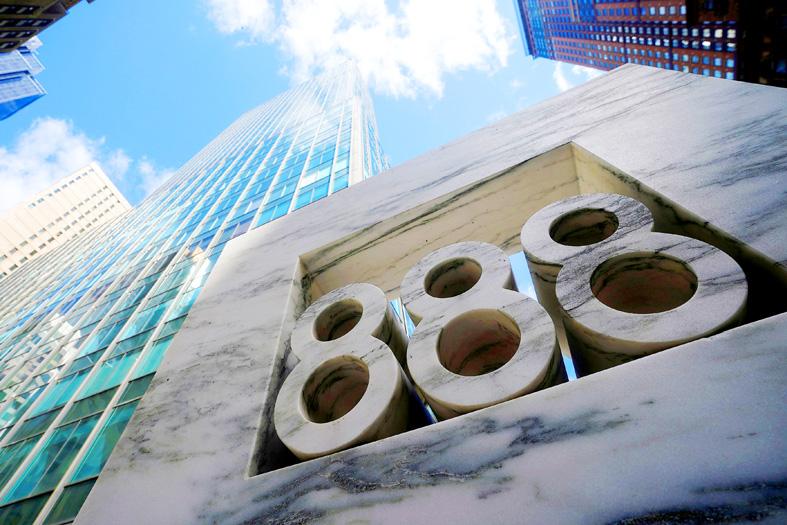The collapse of the Archegos Capital Management LLC fund last month is only the most recent example of how extreme liquidity can make financial markets more volatile and sometimes lead to bizarre outcomes.
Another dramatic instance came in late January, when shares of GameStop Corp skyrocketed following a buying frenzy coordinated by retail investors eager to defend the video game retailer from funds betting against it.
Shares of GameStop have since retreated, but the episode shined an uncomfortable light on online trading platforms and speculative investment funds involved in the financial melee.

Photo: Reuters
In the case of Archegos, leading banks appear poised for hefty losses following billions of dollars in sudden stock liquidations by a fund that had large market exposure backed by very little cash.
Then there has been the wave of special purpose acquisition companies, known as SPACs, which have entered public markets through transactions with fewer rules than traditional stock offerings.
All of these cases show how a flood of liquidity in the wake of accommodative monetary policy is changing Wall Street.
“Stocks have risen extremely quickly from their lows last March, but there is still plenty of liquidity out there,” Meeschaert Financial Services LLC president Gregori Volokhine said.
The US Federal Reserve has been aggressive in pumping funds into the financial system, while US President Joe Biden and his predecessor Donald Trump signed sweeping fiscal packages that primed households and businesses with funds.
“I just don’t know that we’ve seen this much money hit the system this fast between what we’ve seen in stimulus checks and now what we’re going to see with infrastructure,” said TD Ameritrade Holding Corp market strategist JJ Kinahan, alluding to Biden’s US$2 trillion infrastructure plan announced last week.
Some of the volatility is also the result of investors trying to navigate shifts in the market as the economy rebounds with more people vaccinated against COVID-19 and technology shares that prospered during lockdowns lose some of their luster.
“Enterprising investors know they need to find other vehicles besides software, social networks and e-commerce stocks,” Volokhine said. “They’re looking for ways to make more money.”
Implosions such as Archegos’ can happen when funds are “looking to differentiate their returns, which is harder do in a bull market,” Kinahan said.
The churn in the market is sparking talk of more financial regulation. In the wake of GameStop, lawmakers have grilled online trading platform Robinhood over its moves to temporarily restrict trading amid the frenzy.
Robinhood, which itself plans to go public, has also been questioned about its relationships with hedge funds that do business with it.
The Archegos debacle has focused debate on swaps, derivative transactions that can allow big, high-risk bets with small upfront payments.
The opacity of the swaps market makes it a prime candidate for new rules from the Securities and Exchange Commission, Volokhine said.

UNCERTAINTY: Innolux activated a stringent supply chain management mechanism, as it did during the COVID-19 pandemic, to ensure optimal inventory levels for customers Flat-panel display makers AUO Corp (友達) and Innolux Corp (群創) yesterday said that about 12 to 20 percent of their display business is at risk of potential US tariffs and that they would relocate production or shipment destinations to mitigate the levies’ effects. US tariffs would have a direct impact of US$200 million on AUO’s revenue, company chairman Paul Peng (彭雙浪) told reporters on the sidelines of the Touch Taiwan trade show in Taipei yesterday. That would make up about 12 percent of the company’s overall revenue. To cope with the tariff uncertainty, AUO plans to allocate its production to manufacturing facilities in

TAKING STOCK: A Taiwanese cookware firm in Vietnam urged customers to assess inventory or place orders early so shipments can reach the US while tariffs are paused Taiwanese businesses in Vietnam are exploring alternatives after the White House imposed a 46 percent import duty on Vietnamese goods, following US President Donald Trump’s announcement of “reciprocal” tariffs on the US’ trading partners. Lo Shih-liang (羅世良), chairman of Brico Industry Co (裕茂工業), a Taiwanese company that manufactures cast iron cookware and stove components in Vietnam, said that more than 40 percent of his business was tied to the US market, describing the constant US policy shifts as an emotional roller coaster. “I work during the day and stay up all night watching the news. I’ve been following US news until 3am

Taiwan will prioritize the development of silicon photonics by taking advantage of its strength in the semiconductor industry to build another shield to protect the local economy, National Development Council (NDC) Minister Paul Liu (劉鏡清) said yesterday. Speaking at a meeting of the legislature’s Economics Committee, Liu said Taiwan already has the artificial intelligence (AI) industry as a shield, after the semiconductor industry, to safeguard the country, and is looking at new unique fields to build more economic shields. While Taiwan will further strengthen its existing shields, over the longer term, the country is determined to focus on such potential segments as

COLLABORATION: Given Taiwan’s key position in global supply chains, the US firm is discussing strategies with local partners and clients to deal with global uncertainties Advanced Micro Devices Inc (AMD) yesterday said it is meeting with local ecosystem partners, including Taiwan Semiconductor Manufacturing Co (TSMC, 台積電), to discuss strategies, including long-term manufacturing, to navigate uncertainties such as US tariffs, as Taiwan occupies an important position in global supply chains. AMD chief executive officer Lisa Su (蘇姿丰) told reporters that Taiwan is an important part of the chip designer’s ecosystem and she is discussing with partners and customers in Taiwan to forge strong collaborations on different areas during this critical period. AMD has just become the first artificial-intelligence (AI) server chip customer of TSMC to utilize its advanced